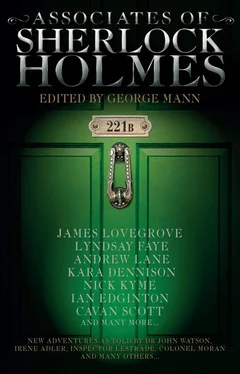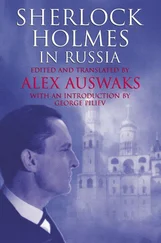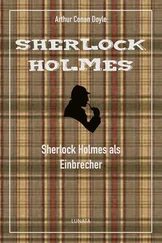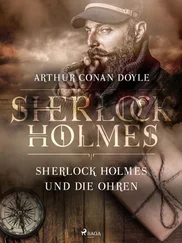The room was filled with a strong smell of carbolic acid and formaldehyde. I took my lavender-scented handkerchief from my pocket and bundled it up beneath my nose. It did not help much.
Dr Watson was standing over the body, examining it intently and professionally. I do not believe I have described him before, and he has never described himself, so let me make the first attempt – he is a man of slightly less than average height, with a rugby player’s physique and a well-kept and luxuriant moustache. His hair is generally brushed back from his forehead, but often flops forwards. It is clear why he is so fortunate with the fair sex. Looking at him now I noticed that his sleeves were rolled up and secured with flexible metal bands and he was wearing a waxed green apron to protect his shirt and trousers from what I shall delicately refer to as the “bodily fluids” of the man on the table.
“Ah, Holmes!” he exclaimed, looking up. His attention moved to me. “And – yes, it’s Mr Pike, is not it? Langdale Pike. What are you doing here?” He moved his gaze back to Holmes. “What is he doing here?”
“Mr Pike is joining me on this case,” Holmes said, his gaze fixed upon the body. “Given that you can only spare a few hours of your precious time, and given also that Mr Pike knows more about the hidden secrets of the average Londoner than most people, it seemed logical so to do. Now, what can you tell me about this gentleman?”
As Watson pointed at an obvious chest wound, which he appeared to have methodically enlarged with a scalpel, I found myself feeling a strange mixture of interest and revulsion. The body – which I presumed to be the unfortunate fiancé, Mr Drake – was of a young man, in his early twenties I would estimate. His hair was blond and rather long, and his body shape – wide shoulders and narrow hips – suggested to me a swimmer, rather than the rugby player that Watson resembled. His eyes were mercifully closed. His skin was white on top, but this faded into a maroon colour for a distance of about two inches from the surface of the table. It was the kind of effect one would obtain if he had been lying in a pool of purple ink for a while, although I could not imagine why anyone would have done that.
Dr Watson noticed my queasy interest. “You’ve noticed how the blood settles in the body under the influence of gravity in the absence of pressure from a heartbeat,” he said, straightening up.
“In that case,” I observed, “I shall endeavour to keep my heart beating for as long as possible. It is a faintly ridiculous look, and I have no intention of indulging in it myself.”
Holmes was still looking at the chest wound, which resembled a flower constructed from dark red meat. Watson turned to join him. “A bullet has obviously entered the body here, and travelled onwards through the heart,” he said.
“The death of this man was almost certainly intentional, then,” Holmes mused. “If the shooter had been aiming at someone else in the crowd then it is extremely unlikely that he would have so accurately hit this man’s heart.”
“I have found a corresponding entrance wound in his back, just to the right of his left scapula.” Watson slid his hands beneath the body and turned it half-over. “Here, take a look.”
Holmes bent over eagerly. I stepped back. This was not the kind of thing I had anticipated to be doing that day. Or, indeed, any day.
“The exit wound is lower than the entrance wound,” Holmes observed. “The shot must have come from above.”
“Indeed,” Watson said. “That was my assumption also.”
“Assume nothing,” Holmes snapped. “It is a valid deduction based on evidence to hand.” He straightened up. “Did you recover the bullet?”
Watson nodded. Letting the body fall back to the table with a flabby thump reminiscent of a large fish hitting a fishmonger’s slab, he crossed to a table at the side of the room and picked up a glass vial. Inside was a twisted piece of metal: brass or copper, I estimated, based upon the colour.
“Quite a soft one,” he observed. “Designed to deform as it travelled through the body. Its velocity had slowed so much that it was caught by the man’s cigarette case. Its diameter is slightly less than half an inch, which suggests that the weapon that shot it was a Martini–Henry rifle or something similar. It’s certainly bigger than the .303 rounds fired by the Martini–Enfield or Lee–Enfield rifles.”
“That would certainly have the range,” Holmes mused. “The Martini–Henry is sighted to 1,800 yards.” He nodded decisively. “Very well: are there any other points of interest to which you would draw my attention?”
Watson shrugged. “The state of the body is similar to half a hundred I saw in Afghanistan.” He clapped his hands and then started to pull off his apron. “Now, if you will excuse me, I have a holiday to return to.”
“Would it have been a difficult shot, in your estimation?”
Watson was, by now, rolling his shirtsleeves down and fastening his cufflinks. “Not if the shooter was a practised hunter – big game in India or deer on the Scottish Highlands, it makes little difference.”
“Distance?”
“A shot like this, taken with a standard rifle by an experienced marksman, could be accomplished accurately – by which I mean within an inch of the aim point – over, perhaps, five hundred yards.”
Holmes glanced over at me. “I do not suppose that you recognise this man from any of your… regular haunts?” he inquired.
I shook my head. “Absolutely not. I would have remembered such a noble brow, and such a fine head of hair. And, of course, those muscular shoulders.”
“Indeed.”
By now Watson had pulled his jacket on, picked up his bowler hat and his medical bag, and was heading for the door. He turned, in the doorway, as if expecting Holmes to say something – “Goodbye”, perhaps, or “Thank you!” – but his friend was frowning and looking at the floor. Instead, I waved at the good doctor, and he left with a scowl on his face.
“We must go to the Vauxhall Pleasure Gardens.” Holmes said. “I need to see the scene of the crime.”
We left the unfriendly edifice of Great Scotland Yard behind us and Holmes hailed a cab to take us to Vauxhall. It was late afternoon, and as the sun began to dip behind the roofs of the buildings, I drew my coat closer around me.
Characteristically, Holmes did not seem to feel the cold. He did not, I had noticed, seem to feel much of anything. I envied him that. I felt too much of everything – my mind is vulnerable to insults and slights that the average man would shrug off, and my skin sometimes feels as if it has been sanded down to a tenth of its previous thickness. I had to try five different laundries before finding one that uses just enough starch to keep my collars and cuffs stiff but not so much that it makes me come out in a rash.
We left the cab at the corner of the Vauxhall Pleasure Gardens, and entered via a gap in the low stone wall and tall hedges that surrounded the area. Lanterns had already been lit and were hanging from posts, and there were enough people promenading along the paths and sitting or lying around blankets and picnic hampers on the grass that it was beginning to look crowded. A band was playing off to our right, and a puppet show was taking place in a booth to our left. I had seen similar scenes many times over the past few years – carefree Londoners enjoying their free time. It made me wistful. I wish I could join in, but I am not a gregarious man.
A young lad in a cloth cap passed by. He winked at me. I was about to wink back when I remembered that I was on what I can only describe as “duty”. With a tinge of sadness in my heart, I looked away.
Читать дальше












